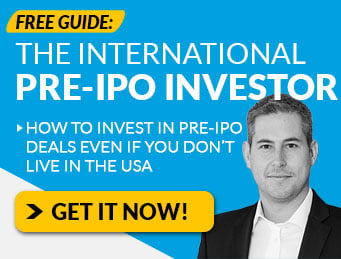If you’re new to private market investing, chances are, you have a lot of questions about crowdfunding and not a lot of answers.
Want some help? Go here and fill out this short survey and I’ll write something up for you in one of our daily emails.
So far, one of the top questions I’ve received this week from our Equifund subscribers is some version of…
“How do I screen potential investments?”
And the answer is actually surprisingly simple…
The first step is – without a doubt – to create your Investment Policy Statement (IPS).
If you’re not clear on what your financial goals are and what types of investment opportunities you’re looking for… you’re going to waste a lot of time looking at deals that simply aren’t a good fit for your goals.
But let’s assume you’ve already created your IPS and you’re analyzing a deal…
The second step is looking for any major “red flags” in the deal that would allow you to instantly say “no thank you!”
The faster you can disqualify the deal, the faster you can move on to the next deal.
Once you’ve found a deal that looks like it’s worth further due diligence…
The third step is to use an organized scoring system that helps me rank your confidence level in what I call The 7 Power Laws.
They are…
Power Law #1: Purpose
(Strength of Vision)
Do you believe the purpose of the business is big enough, exciting enough, and compelling enough to succeed against all odds?
And more importantly, is that a vision you want to support and be a part of?
Power Law #2: People
(Strength of Team)
Do you believe the management team has what it takes to attract, retain, and develop key talent needed to make their vision a reality?
It doesn’t matter how inspiring the vision is if the people can’t execute.
How confident are you that they are the right people for this mission? And how confident are you they’ll be able to scale their culture and build a community?
Power Law #3: Partners
(Strength of Network)
Do you believe the company has the right relationships with other businesses, government agencies, or important market participants?
No business exists in a vacuum. It’s in a living, breathing community called a “market.”
In that market, there are other people who serve your customers, supply your competitors, and control your regulatory burdens.
Instead of trying to build everything from scratch, smart CEOs will turn to strategic partnerships, joint ventures, and affiliate relationships.
These key relationships could unlock a new distribution channel, decrease cost of goods sold, or speed things up in one of the many bureaucracies that impact returns.
How confident are you they can form those relationships?
Power Law #4: Intellectual Properties
(Strength of Moat)
Do you believe this business has a clear strategy for expanding and protecting their competitive advantage?
There’s an old saying that goes something like “The Pioneers get the arrows – the Settlers get the land”
This means that the people who put in all the effort to innovate are rarely the people who get the financial rewards.
That’s why it’s critical the company understands how to protect itself from well funded competitors who can copy their products and beat them to the prize.
In practical terms, this means the company needs to have a strategy for creating, monetizing, and protecting their intellectual property.
How confident are you in their ability to create, monetize, and defend their secret sauce?
Power Law #5: Brand Promises
(Strength of Products)
Do you believe in the company’s ability to fulfill its promises to its customers?
Peter Thiel, in his book Zero to One, writes…
Every startup is small at the start. Every Monopoly dominates a large share of its market. Therefore, every startup should start with a very small market.
Always err on the side of starting too small. The reason is simple: it’s easier to dominate a small market than a large one.
Entrepreneurs who are relentlessly customer focused tend to create great products that sell themselves.
Why? Because they’re in the market talking to their customers, trying to help them solve their problems, and doing whatever it takes to help them get results.
Those products are going to wind up being so remarkable, those customers will tell everyone they know about how good it is.
Power Law #6: Promotions
(Strength of Sales and Marketing Strategy)
Do you believe in the company’s ability to acquire, monetize, and retain new customers at scale?
According to Naval Ravikant: “The great companies have a killer combo of builder + seller “
For example, Apple had Steve Wozniak (builder) and Steve Jobs (seller).
You obviously want the best products possible and tons of referrals from happy customers…
But new customers don’t just happen by accident.
It happens because there’s an organized process someone goes through that leads them to a buying decision.
In the beginning, this might happen in a one-on-one setting (like direct sales). But as you scale, it needs to happen on a “one-to-many” basis.
There’s lots of ways to grow a business, so I won’t dive deep into things like media buying, email marketing, or direct mail…
But I want to know the team can rapidly grow sales and take market share… without dropping the ball on customer service.
Power Law #7: Profits
(Strength of Business Model)
Do you believe the company has the potential to deliver a meaningful financial return?
At the end of the day, we’re investing because we want to generate a return.
And that means we are putting our faith in the company to be good stewards of our capital and grow it for us.
This means you’ll want to have a clear understanding of how their business model works…
How valuation is being determined (and how it will grow over time)…
And how you – the investor – make money in the deal.
Sincerely,

Jake Hoffberg – Publisher
Equifund










